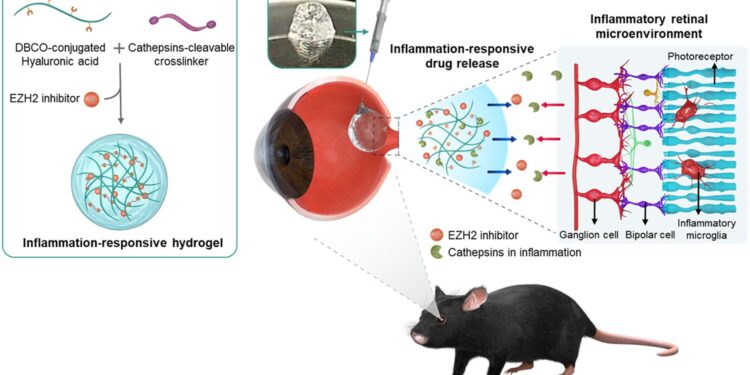Schematic illustration of a syringe-injectable inflammation-responsive hydrogel for suppression of inflammatory microglia to prevent photoreceptor death in retinitis pigmentosa. A The inflammation-responsive hydrogel is formed by cross-linking DBCO conjugated to hyaluronic acid and the azide of the cathepsin-cleavable cross-linker. b The EZH2 inhibitor containing a hydrogel response to overexpressed cathepsins in the inflammatory environment of the retina; and suppress inflammation via the disease-dependent EZH2 inhibitor released by the hydrogel. Credit: npj Regenerative Medicine (2023). DOI: 10.1038/s41536-023-00342-y
A research team successfully incorporated anti-inflammatory drugs into a hydrogel to suppress inflammation in the retina and effectively deliver the drugs to the inflamed area.
Age-related macular degeneration and retinitis pigmentosa are incurable eye diseases that cause blindness due to progressive damage to photoreceptor cells, which convert light into biological signals in the retina, the light-sensitive tissue located at the back of the eye.
Age-related macular degeneration is a disease that damages the macula, the central part of the retina, and is the leading cause of blindness in people over 65. Retinitis pigmentosa, on the other hand, is a genetic disease that causes progressive death of photoreceptor cells in the retina and affects approximately one in 4,000 people worldwide, initially causing night blindness, but ultimately leading to vision loss.
Currently, there is no effective cure for these two diseases, and one treatment involves injecting anti-inflammatory drugs into the eye to slow the extent of retinal damage. However, these injections only work as long as the drug remains in the eye, requiring patients to visit a clinic for intraocular injections every four to 12 weeks, depending on how long the drug’s effect lasts.
For the first time, the team used a substance that inhibits the inflammatory factor EZH2, which contributes to retinal degeneration, as well as an anti-inflammatory agent. When mice with retinal degeneration were injected with the anti-inflammatory drug, the progression of retinal degeneration slowed. The article is published in the journal npj Regenerative Medicine.
Researchers successfully developed a hydrogel that slowly degrades upon encountering the enzyme cathepsin, typically overexpressed in inflammatory environments, to deliver anti-inflammatory drugs. When the team’s drug-loaded, inflammation-responsive hydrogel was injected into the eyes of mice suffering from retinal degeneration, inflammatory factors in the retina were reduced to about 6.1 percent.
The team also found that the protective effect on photoreceptor cells, known to be destroyed by retinal degeneration, was approximately four times higher than in the control group, effectively delaying vision loss.
Overexpression of inflammatory factors and cathepsins in the in vivo retinitis pigmentosa model. Credit: npj Regenerative Medicine (2023). DOI: 10.1038/s41536-023-00342-y
Notably, the hyaluronic acid-based hydrogel, which has similar mechanical and optical properties to the vitreous body of the eye, allows for different rates of hydrogel degradation in each patient, thereby minimizing the need for injections. repeated.
This newly developed technology is expected to reduce the economic burden and the risk of accidents during outpatient visits for patients with mobility difficulties due to visual impairment. Additionally, for patients in the early stages of symptoms, reducing the frequency of hospital visits may alleviate the inconveniences of daily life.
The team included Dr Maesoon Im from the Brain Science Institute, as well as Professor Seung Ja Oh from Kyung Hee University and Professor Kangwon Lee from Seoul National University,
“For future commercialization, we plan to scan the amount of drug and hydrogel used, as well as the treatment period, based on disease progression. We also intend to evaluate long-term stability of the drug delivery system,” said Dr. Maesoon Im of the Korea Institute of Science and Technology.
“In addition to degenerative retinal diseases, we will study levels of inflammation in other retinal diseases to see if our inflammation-responsive drug delivery system would work in these conditions,” said Professor Seung Ja Oh.
More information:
Hyerim Kim et al, Effective photoreceptor protection using inflammation-responsive hydrogel to alleviate outer retinal degeneration, npj Regenerative Medicine (2023). DOI: 10.1038/s41536-023-00342-y
Provided by the National Science and Technology Research Council
Quote: New treatment developed to significantly slow the progression of retinal diseases responsible for blindness (February 14, 2024) retrieved February 14, 2024 from
This document is subject to copyright. Apart from fair use for private study or research purposes, no part may be reproduced without written permission. The content is provided for information only.



